'Never forget': Survivors want Holocaust taught to younger generations
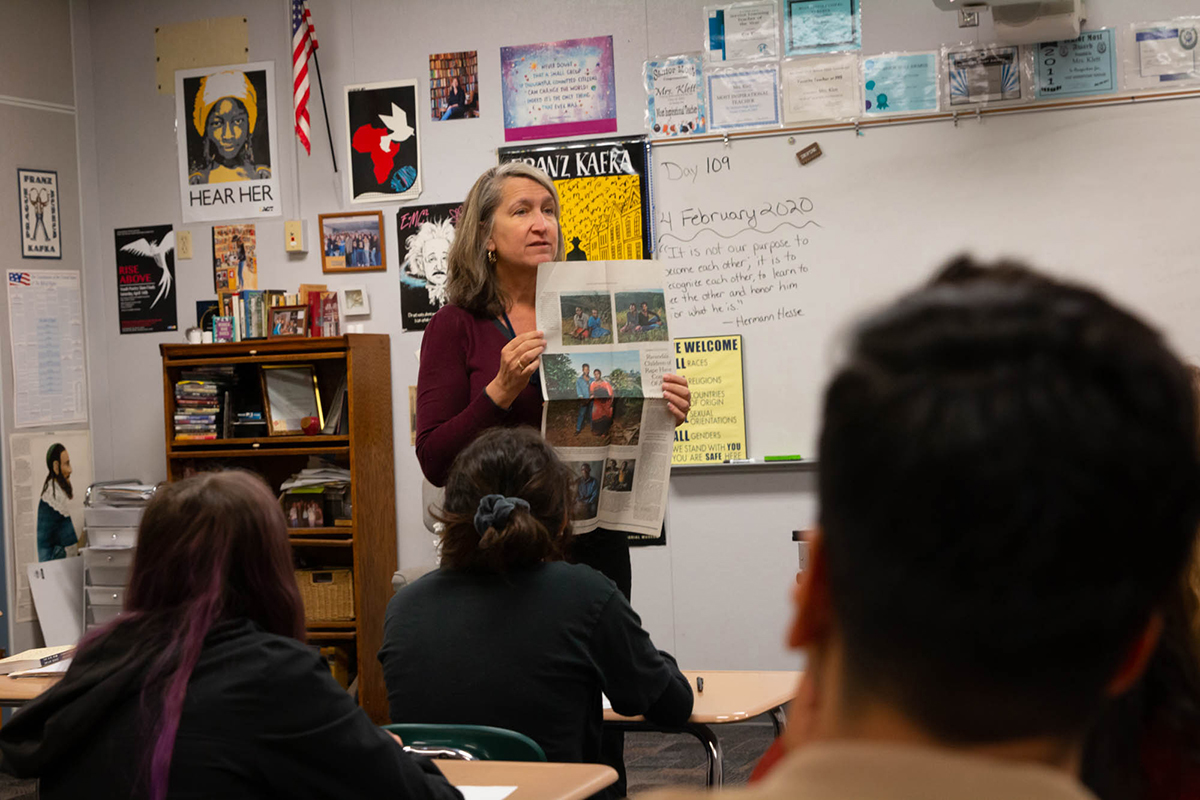
Kim Klett, a teacher at Dobson High School, holds up a newspaper story about Rwandan genocide during her Holocaust literature class. The Holocaust and other genocides share common threads, Klett said, and she compares the relationship between the Germans and Jews to that of the Tutsi and the Hutu five decades later in Rwanda. (Photo by Delia Johnson/Cronkite News)
Knowledge of the Holocaust wanes for millennials, Gen Z
By Jonmaesha Beltran/Cronkite News |
During the Holocaust, other groups like Roma, also known as Gypsies, Germans with disabilities and homosexuals were targeted and killed by the Nazis, according to the U.S. Holocaust Memorial Museum.
Over the years, the state expanded its curriculum to include 9/11, the Darfur War, the Ukrainian famine, Armenian and Native American genocides, according to New Jersey’s Department of Education.
Students read “Night,” writer Elie Wiesel’s memoir of his experience as a teenager in a Nazi concentration camp.
The Holocaust began with stripping away rights such as excluding Jews from civil service positions, the burning of non-German books on university campuses and limiting the number of Jewish students in schools.
Nuremberg Laws, established in 1935, revoked citizenship for Jews and prohibited them from marrying or having sexual relations with Germans. The laws were inspired by Jim Crow laws that enforced racial segregation in the South, according to the University of Southern California.
The number of anti-Semitic incidents in the U.S. grew more than 50% from 2009 to 2018, according to the Anti-Defamation League. In Arizona, there were 32 reported incidents in 2018.
The last major German offensive campaign in World War II against the western front, according to the U.S. Holocaust Memorial Museum.
PHOENIX – Seventy-five years after the atrocities of Auschwitz, memories of the Holocaust are fading for younger generations who learn little about genocides in school, according to education advocates who believe they have the answer: Make it Arizona law to teach about the horrors of the Nazi’s “Final Solution.”
After a 2018 study showed that two-thirds of millennials couldn’t identify the Auschwitz death camp or that 6 million Jews were killed in the Holocaust, survivors and supporters expressed concern.
Anti-Semitism is on the rise, survivors are aging and younger generations are either unaware of the Holocaust or are forgetting the lessons it taught.
“This is soon going to be about cultural memory produced and reinforced by people who are not eyewitnesses or witnesses to the time,” said Arizona State University history professor Volker Benkert.
Dozens of white-haired Holocaust survivors crowded into a hearing room in January at the state Capitol to support House Bill 2682, which would require the State Board of Education to add a genocide curriculum to the hundreds of middle and high schools in Arizona. It would have to be taught at least twice from seventh grade to senior year.
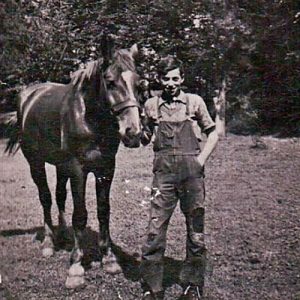
Oskar Knoblauch was forced to work on a farm in 1943 after the Nazis occupied Poland. (Photo courtesy of Oskar Knoblauch)
Holocaust survivor Oskar Knoblauch, 94, often tells the story of one of the “upstanders” who helped him survive when he was a scrawny, starving teen forced to work in the ghetto of Krakow, Poland. A Polish Roman Catholic man, noticing how weak Knoblauch was, risked his life to sneak bread to him.
“Would you have saved a skinny, dirty Jew like me – risking your lives and your families’ lives because if you were to be caught, you would have been shot,” Knoblauch told lawmakers.
It’s essential, he said, to teach young people to stand up for others.
Educators and community leaders said it’s also important to teach lessons about such atrocities as the Rwandan and Bosnian genocides and the erasure of indigenous people in America to prevent them from happening again. But teachers often don’t have the time or resources to spend on in-depth lessons.
Here’s how a stellar education might work, they say: Teachers get training to teach with sensitivity, thoroughness, and consistency at the state level so they can connect younger generations to a past that can better explain the turmoil of the world today. That means showing the lingering effects of slavery, the mistreatment of indigenous people and the tragedy of racial and religious intolerance that decimated millions of people.
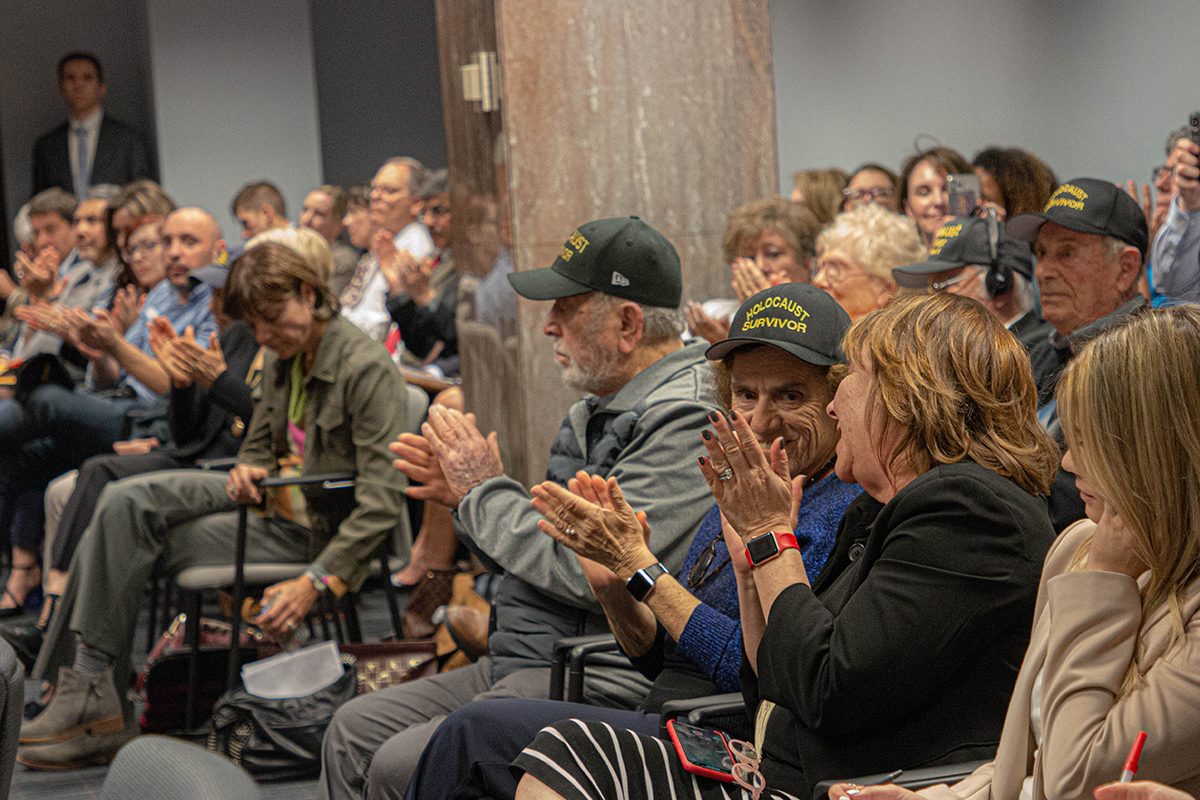
Holocaust survivors and supporters asked state lawmakers to require that the Holocaust of World War II and other historic genocides to be taught in Arizona schools. (Photo by Annabella Piunti/Cronkite News)
Mesa high school senior Maritza Sanchez said she was naive when she first stepped into a year-long course on Holocaust literature.
“It’s crazy to think that stuff like this actually happened,” said Sanchez, 17. “It still amazes me that it’s not like a movie or a scene of a fictional book. It actually happened, and there’s evidence that it happened, and there were so many people that were just bystanders.”
She was determined not to be a bystander to bias. She joined the Anti-Defamation League at Dobson High School.
“We learned now in our club that if someone tries to offend someone by saying, ‘Oh, that’s gay,’ ask them what do you mean by that,” she said. “It’s just trying to stop those little comments that can hurt someone a lot.”
Michael Beller and Josh Kay, co-founders of Arizona Teaching the Holocaust, an online petition to require Holocaust education in schools, are behind the bill.
Last year the two raised more than $5,000 and collected a growing number of online signatures to urge lawmakers to require students in upper grades to learn about genocides. The State Board of Education would establish the curriculum.
Kay said he learned about the Holocaust from a survivor – his grandfather. Talks with him spurred Kay’s actions decades later.
“We thought that this was a good place for us to say, ‘We should try to teach as much as we can about the Holocaust, about genocide, about all the things that people can do to each other that should be prevented,’ ” he said.
The petition was started after the Phoenix Holocaust Association and advocates worked last year with Rep. Michelle Udall, R-Mesa, to create House Concurrent Resolution 2032, which encouraged schools to teach about the Holocaust from eighth grade to senior year of high school. But it ground to a halt in the Senate.
One day v. one year of lessons
Sanchez said the Holocaust was discussed in a one-day lesson in her history classes.
“The main point we learned in history is that the U.S. joined World War II because Japan attacked Pearl Harbor,” Sanchez said. “They don’t get into depth on that millions of people were shot and killed in camps.”
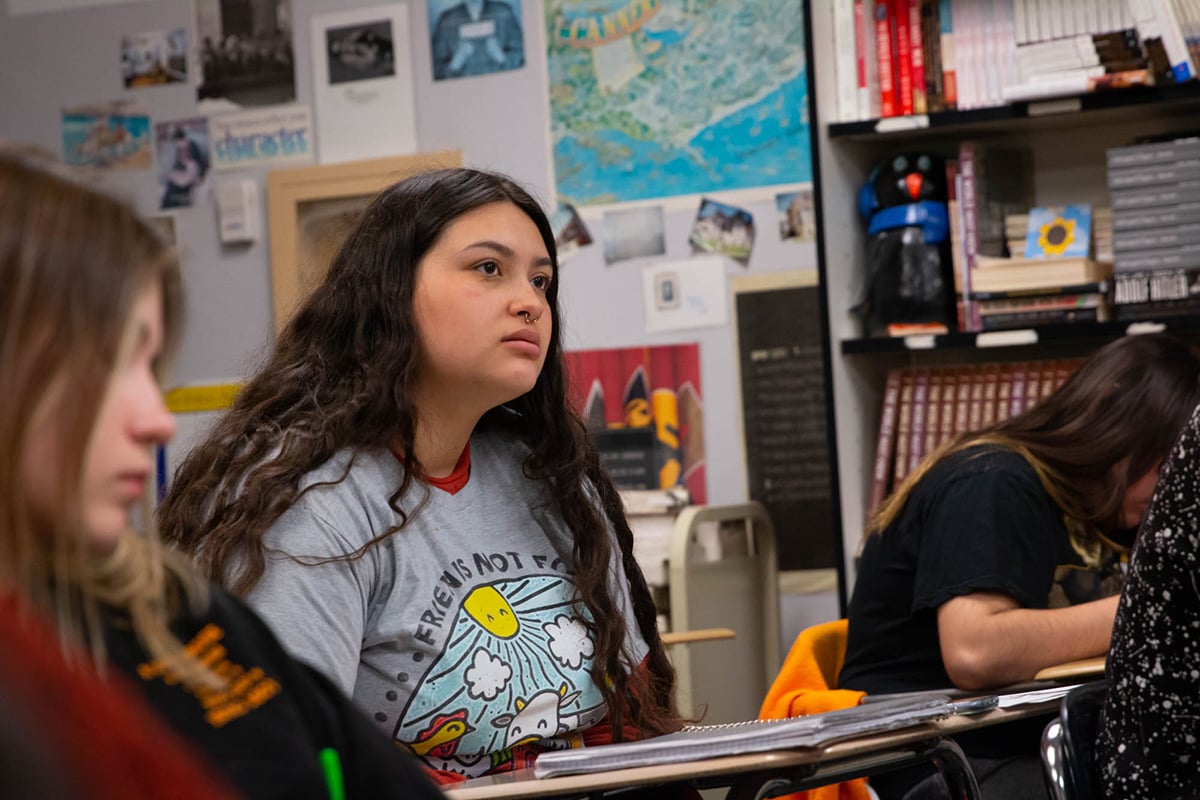
John-David Bowman, a social studies teacher who teaches U.S. history and Advanced Placement world history at Deer Valley High School, said state standards mean he does not spend a lot of time teaching students about genocides.
He said he’s supposed to spend only five minutes on the Holocaust in U.S. history class because it’s not U.S. history.
However, in a world history class, “we spent about a week on the Holocaust and other genocides,” he said.
That’s in contrast to Kim Klett, an English teacher who teaches Holocaust and genocide literature at Dobson High School to seniors like Sanchez over two semesters.
She said the quality of teaching is as important as the amount of time spent. She recommends funding for teachers to take professional development classes.
“If it’s not required, a lot of teachers are not going to teach it. If we have something in place that says you have to teach it, they’re going to,” she said, adding that investing in training will make a difference. “It’s such a sensitive topic. You need to be very careful with the teaching of it.”
Missteps around how slavery is taught in schools show what can go wrong when teaching about genocides, said Timothy Langille, a lecturer in Jewish studies and religious studies at Arizona State University.
“I had one student in my genocide class in the fall, who is Latinx, and she told me how the Holocaust was taught to her in high school. The teacher just basically said, ‘You would have died ,’ and that’s what she took away,” he said.
Never again
The Anne Frank Center for Mutual Respect supports a 50-state Holocaust and genocide education initiative.
Arizona would become the 13th state to require educating students on the Holocaust and other genocides, according to Pew Research Center. Oregon was the most recent state to enact the mandate when a 14-year-old girl came up with the idea after befriending a 92-year-old Holocaust survivor.
Beyond calling for the teaching of the “Holocaust and other genocides” in the bill, Arizona advocates don’t offer recommendations on the approach or details of such lessons.
Lawmakers across the country often ask what the curriculum should look like, said Elisa Rapaport, the chief operating officer for the Anne Frank Center.
“Some of them don’t want it to be just about Holocaust education. They would appreciate it if it were more general, about humanity and inhumanity throughout the past,” she said.
New Jersey was an early adopter of that approach, passing a law in 1994. The curriculum teaches the issues of bias, prejudice, bigotry, and bullying through the lens of the Holocaust and other genocides for K-12 students.
“Every single week, we receive requests from people writing to us saying, ‘How can I help? This is so important,’ ” Rapaport said. “We know that the majority of people believe that Holocaust education should be taught in schools. It’s just the matter of getting the work done and making it happen.”
At the federal level, a bill called the Never Again Education Act passed through the House in late January and is now headed to the Senate. If enacted, the bill would expand the U.S. Holocaust Memorial Museum’s education programming to teachers nationwide.
Genocides repeat
Klett has been teaching Holocaust literature since 2001 at Dobson. She took a similar class in college, which inspired her to teach the course.
“I saw how it connected to our own world and taught lessons beyond history,” she said.
The course focuses on the rise of Hitler in 1933 to the end of World War II in 1945. During the course, students read books , hear the stories of Holocaust survivors and go to events dedicated to the remembrance of genocides.
Students complete a listening activity where they go out into the hallways and listen to how students talk to one another about race, religion, gender and sexual orientation.
Klett said students notice a lack of civility, kindness and how people don’t think before they speak – characteristics that span generations.
“We say, ‘Oh my gosh, those people were just terrible and none of those things happen today,’ ” she said. “Before we wag our fingers at people in the past, look at ourselves first.”
Klett also shows genocides aren’t limited to 1945.
In class one day, Klett held up a newspaper about the 1994 massacre of the Tutsis in Rwanda.
“What began the genocide?” she asked, pointing to a timeline on the wall that shows the slow build to the Holocaust.
She compared the relationship between the Germans and Jews to that of the Tutsi and the Hutu five decades later.
“These two groups had gotten along for many, many years,” she said of Rwanda. “They had intermarried. It’s kind of like the Jews in Germany, in the beginning.” The Jews assimilated – “they were a part of the society and the culture,” she said.
Years later, in Rwanda, history repeated – “You have this killing of neighbors.”
Langille, the university lecturer in Jewish studies, also said the Holocaust focuses a lens on other fraught times.
“Something that I’m teaching now to my students is how Jim Crow, here in America, informed Nazi Nuremberg laws . We’re not separated from this in the past, let alone the present,” he said.
Klett said she’s been working with Bosnia teachers who are using the Holocaust as a module to make connections to the Bosnia War in the 1990s, where nearly 8,000 Muslim boys and men from Bosnia were killed in a mass movement of “ethnic cleansing.”
“I think it’s important to look at what’s happened on our own soil by looking at slavery, looking at Native Americans – looking at these different areas where we’ve seen inhumanity and genocide,” she said.
Anti-Semitism rises
Benkert said the Holocaust affects the modern “political landscape.”
“I think there’s an enormous danger. There’s a presence of the far-right movement that I didn’t think possible,” he said.
Two Jewish community centers in Arizona were part of a string of bomb threats to Jewish community centers and schools across the United States in 2017.
After a spate of anti-Semitic incidents on college campuses, President Trump signed an executive order to combat anti-Semitism last year. In the same year, A Nazi group posted flyers of swastikas around Arizona State University’s Tempe campus.
Langille said a decade ago he wouldn’t have imagined seeing anti-Semitism, racism and Islamophobia in 2020. He said the problem is when deniers and public officials are given a platform to voice some of these ideologies.
Some people link the lack of knowledge about the Holocaust to anti-Semitism. Benkert said that’s not the case.
“It’s a threat to people, particularly Jewish people but more generally to people who don’t conform to their ideals,” he said. “This is not for a lack of education – these guys know exactly what they’re doing.”
Anti-Semitic views fester in other parts of the world. Nearly one in five people in Europe said anti-Semitism in their countries was a response to the everyday behavior of Jewish people, according to a CNN poll.
Surviving horror
Knoblauch said it’s horrible that more than 60 million people died during World War II “over someone who hated Jews.”
Knoblauch said he has spoken to thousands of people at schools, religious organizations and corporations in Arizona, including the Border Patrol. He has received hundreds of letters from students as young as 10 years old, who say his stories have changed their lives.
He teaches students to be upstanders, to do the right thing. Without allies, he wouldn’t be alive.
“Those people were not Jews. They were Roman Catholics, Germans and Nazis who stood up for me, risking their own lives to keep me alive. That’s what upstanders do.”
Bowman, the social studies teacher, said he had invited Holocaust survivors and World War II veterans to his class, but once those who have experienced it dies, those stories are gone with them.
“To read something in a book, to see it on a screen is one thing but to be able to shake the hand of someone who survived the Holocaust or served in Battle of the Bulge – That has an impact on students that I think is priceless,” Bowman said.
The Phoenix metro area has about 50 Holocaust survivors and about 25 survivors live in Tucson, according to Anthony Fusco, the education coordinator at the Arizona Jewish Historical Society.
This year marked the 75th anniversary of the liberation of the Auschwitz death camp, where nearly 1.1 million Jews lost their lives.
The Registry of Holocaust Survivors contains the names of more than195,000 people who survived the Holocaust. But a growing number of people have died in the last 15 years, according to the United States Holocaust Memorial Museum.
Those original voices will eventually become silent, but landmarks and memories will remain, Benkert said.
The traces of World War II are all around Arizona – such as the Japanese internment camps in the Phoenix area and the Beth Hebrew Synagogue, the building whose ownership was shared by a family that saved 1,500 people during the Holocaust.
“You don’t have to dig very deep to find history – it’s there all the time,” he said.

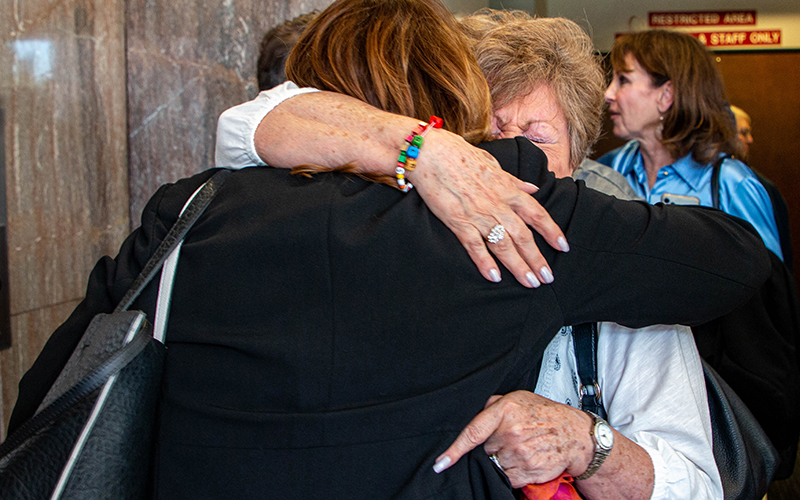
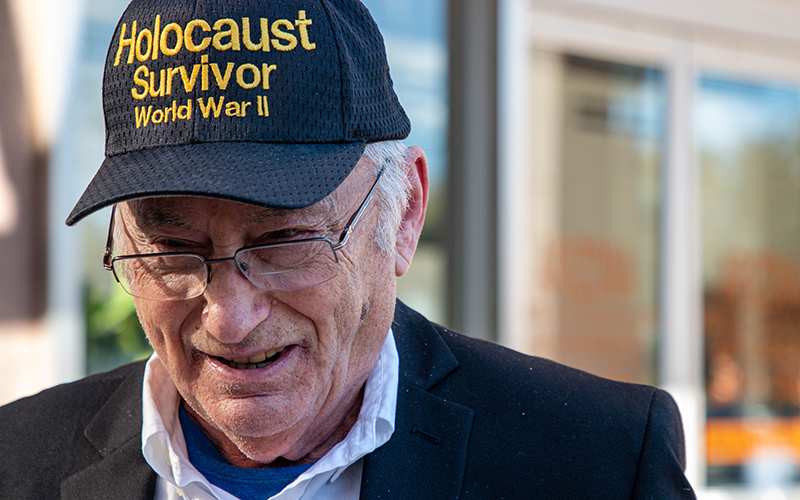
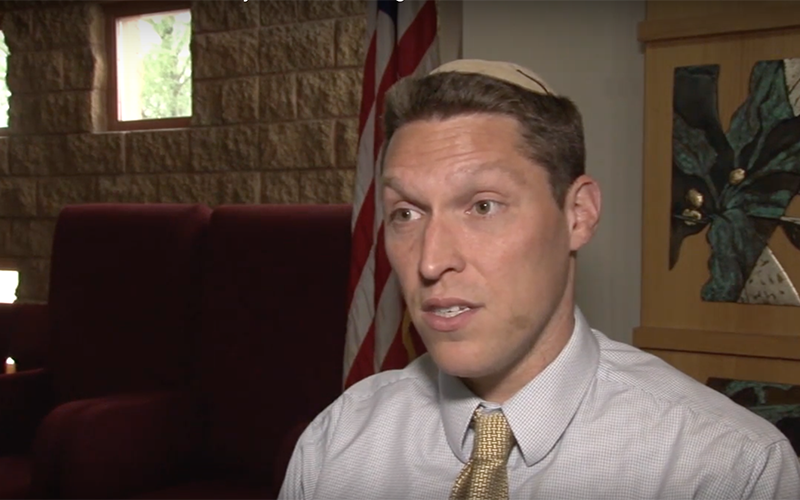
Leave a Comment
[fbcomments]